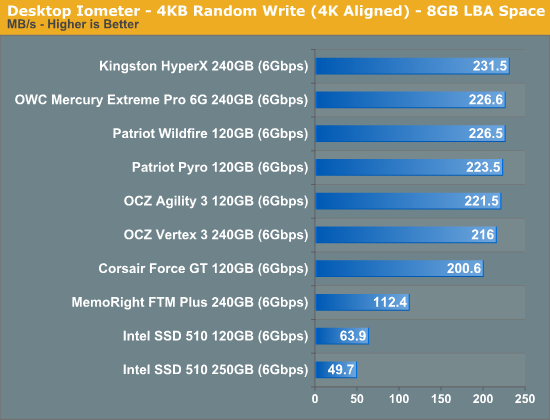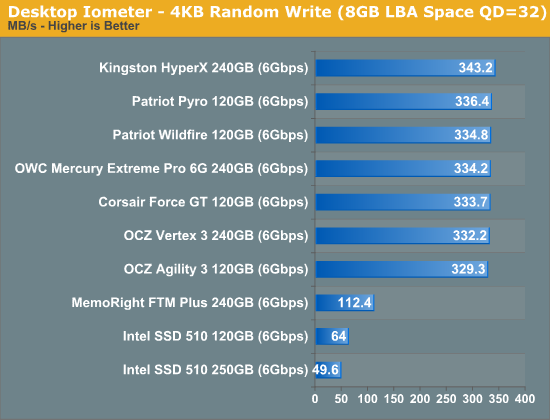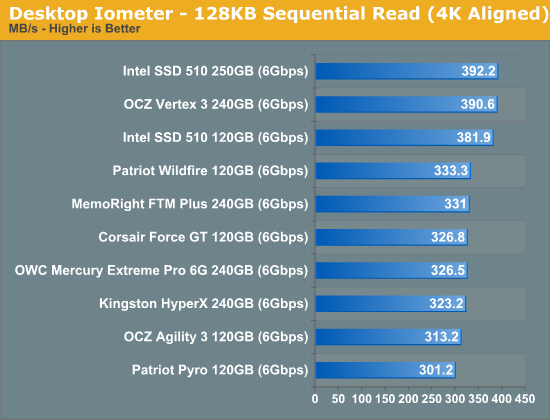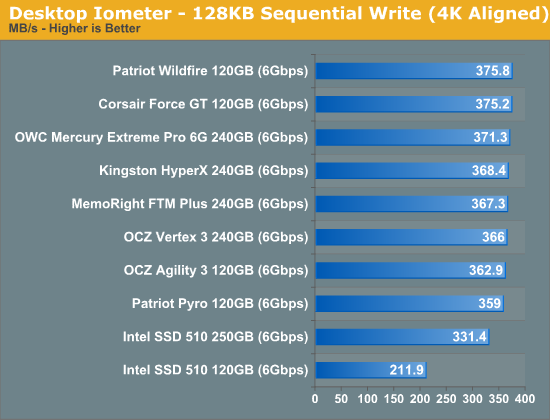The SandForce Roundup: Corsair, Kingston, Patriot, OCZ, OWC & MemoRight SSDs Compared
by Anand Lal Shimpi on August 11, 2011 12:01 AM ESTRandom Read/Write Speed
The four corners of SSD performance are as follows: random read, random write, sequential read and sequential write speed. Random accesses are generally small in size, while sequential accesses tend to be larger and thus we have the four Iometer tests we use in all of our reviews.
Our first test writes 4KB in a completely random pattern over an 8GB space of the drive to simulate the sort of random access that you'd see on an OS drive (even this is more stressful than a normal desktop user would see). I perform three concurrent IOs and run the test for 3 minutes. The results reported are in average MB/s over the entire time. We use both standard pseudo randomly generated data for each write as well as fully random data to show you both the maximum and minimum performance offered by SandForce based drives in these tests. The average performance of SF drives will likely be somewhere in between the two values for each drive you see in the graphs. For an understanding of why this matters, read our original SandForce article.

Random read performance is pretty consistent across all of the SF-2281 drives. The Patriot drives lose a bit of performance thanks to their choice in NAND (asynchronous IMFT in the case of the Pyro and Toggle NAND in the case of the Wildfire).

Most random writes are highly compressible and thus all of the SF-2281 drives do very well here. There's no real advantage to synchronous vs. asynchronous NAND here since most of the writes never make it to NAND in the first place. The Agility 3 and Vertex 3 here both use their original firmware while the newer drives are running the latest firmware updates from SandForce. The result is a slight gain in performance, but all things equal you won't see a difference in performance between these drives.
The MemoRight FTM Plus is the only exception here. Its firmware caps peak random write performance over an extended period of time. This is a trick you may remember from the SF-1200 days. It's almost entirely gone from the SF-2281 drives we've reviewed. The performance cap here will almost never surface in real world performance. Based on what we've seen, if you can sustain more than 50MB/s in random writes you're golden for desktop workloads. The advantage SandForce drives have is they tend to maintain these performance levels better than other controllers thanks to their real-time compression/dedupe logic.
Many of you have asked for random write performance at higher queue depths. What I have below is our 4KB random write test performed at a queue depth of 32 instead of 3. While the vast majority of desktop usage models experience queue depths of 0 - 5, higher depths are possible in heavy I/O (and multi-user) workloads:

All of the SF-2281 drives do better with a heavier load. The MemoRight drive is still capped at around 112MB/s here.
Sequential Read/Write Speed
To measure sequential performance I ran a 1 minute long 128KB sequential test over the entire span of the drive at a queue depth of 1. The results reported are in average MB/s over the entire test length.

The older SF-2281 firmwares did a bit better in some tests than the newer versions, hence the Vertex 3 being at the top here. All of the newer drives perform pretty similarly in our sequential read test.

The same goes for our sequential write test - all of the SF-2281 drives perform very similarly.










90 Comments
View All Comments
V3ctorPT - Thursday, August 11, 2011 - link
Exactly what I think, I have an X25-M 160Gb and that thing is still working flawlessly with the advertised speeds, every week he gets the Intel Optimizer and it's good...Even my Gskill Falcon 1 64Gb is doing great, no BSOD's, no unexpected problems, the only "bad" thing that I saw was in SSD Life Free, when it say's my SSD is at 80% of NAND wear n' tear, my Intel is at 100%.
CrystalDisk Info confirms those conditions (that SSD Life reports), Anand, do you think these "tools" are trust worthy? Or they're some sort of scam?
SjarbaDarba - Sunday, August 14, 2011 - link
Where I work - we have had 265 Vertex II drives come back since June 2010.That's one every day or two since for our 1 store, hardly reliable tech.
Ikefu - Thursday, August 11, 2011 - link
"a 64Gb 25nm NAND die will set you back somewhere from $10 - $20. If we assume the best case scenario that's $160 for the NAND alone"I think you meant to say an 8Gb Nand die will set you back $10-$20. Not 64Gb
Yay math typos. Those are always hard to catch.
bobbozzo - Thursday, August 11, 2011 - link
No, 64Gb = 8GBNote the capitalization/case.
Ryan Smith - Thursday, August 11, 2011 - link
We're using gigaBITs (little b), not gigaBYTEs (big B).64Gb x 16 modules / 8 bits-to-bites = 128GBytes.
Ikefu - Thursday, August 11, 2011 - link
Ah Capitalization for the loss, I see my error now. Thank you =)Later in the article they refer to 8GB so the switch from Gigabits to Gigabytes through me.
philosofool - Thursday, August 11, 2011 - link
I made the same mistake at first.Can I request that, in the future, we write either in terms of bytes or bits for the same type of part? There's no need to switch from bits to bytes when talking about storage capacity and you just confuse a reader or two when you do.
nbrenner - Thursday, August 11, 2011 - link
I understand the GB vs Gb argument, but even if it takes 8 modules to make up 64Gb it was stated that a 64Gb die would set you back $10-$20, so saying a 128Gb drive would cost $160 didn't make any sense until 3 paragraphs later when it said the largest die you could get is 8GB.I think most of us read that if 64Gb is $10-$20, then why in the world would it cost $160 to get to 128Gb?
Death666Angel - Friday, August 12, 2011 - link
Unless he edited it, it clearly states "128GB". I think the b=bit and B=byte is quite clear, though I would not complain if they stick with one thing and not change it in between. :-)Mathieu Bourgie - Thursday, August 11, 2011 - link
Once again, a fantastic article from you Anand on SSDs.I couldn't agree more on the state of consumer SSDs and their reliability (or lack of...).
The problem as you mentioned is the small margins that manufacturers are getting (if they are actually manufacturing it...), which results in less QA than required and products that launch with too many bugs. The issue is, this won't go away, because many customers do want the price per GB to go down before they'll buy. Probably waiting for that psychological $1 per GB, that same 1$ per GB that HDDs reached many years ago.
With prices per GiB (actual capacity in Windows) dropping below $1.50, reliability is one of the last barrier for SSDs to actually become mainstream. Most power users now have one or are considering one, but SSDs are still very rare in most desktops/laptops sold by HP, Dell and the like. Sometimes they will be offered as an option (with additional cost), but rarely as a standard drive (only a handful or two of exceptions come to mind for laptops).
I can only hope that the reliability situation improves, because I do wish to see a major computing breakthrough, that is for SSDs to replace HDDs entirely one day. As you said years ago in an early SSD article, once you had a SSD, you can't go without one.
My desktop used to have two Samsung F3 1TB in RAID 0. Switching to it from my laptop (which had an Intel 120GB X25-M G2) was almost painful. Being accustomed to the speed of the SSD, the HDDs felt awfully slow. And I'm talking about two top of the line (besides raptors) HDDs in RAID 0 here, not a five year old IDE HDD here.
It's always a pleasure to read your articles Anand, keep up the outstanding work!